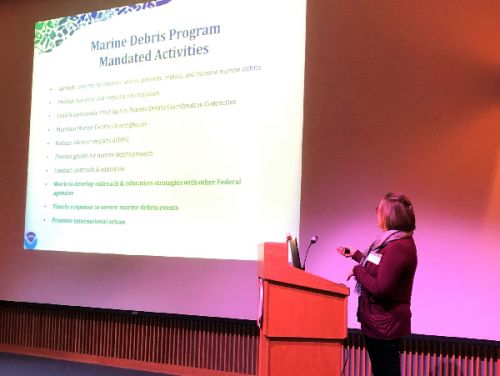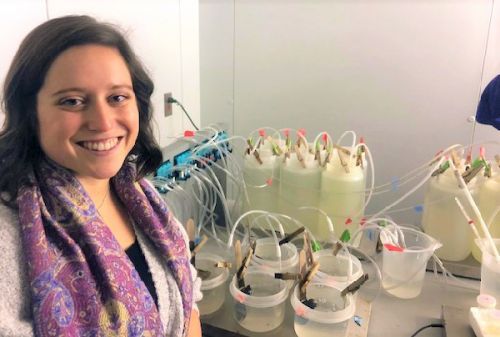Marine Debris Research in New England
OCTOBER 28, 2019 — During the week of October 14, NOAA Marine Debris Program Research Coordinator, Carlie Herring, and NOAA Marine Debris Program Northeast Regional Coordinator, Demi Fox, participated in a research road trip through New England.
Their journey started at the University of Connecticut, Avery Point, where they met with partners analyzing the selective ingestion of microplastics by oysters. The next stop was U.S. Environmental Protection Agency’s (EPA) Atlantic Ecology Division in Narragansett, Rhode Island to visit environmental research scientist, Dr. Kay Ho. Kay led a tour of her lab (including a ‘clean lab’ featuring glass, metal, and wooden equipment to reduce microfiber contamination in their samples) and spoke about EPA’s current and upcoming research projects.
Carlie and Demi then traveled to Woods Hole, Massachusetts, where they attended a public forum: Microplastics in the Ocean: Emergency or Exaggeration? This event was followed by a three-day microplastic workshop titled, The Science of Microplastics in the World Ocean: An International Workshop to Formulate Next Steps in Understanding the Fate, Distribution, Impacts, and Technology Development Necessary to Push the Science. World renowned microplastic researchers, covered topics like the need for standards and best practices in sampling and reporting methods, state-of-the-art polymer classification techniques, assessing the fate of plastics (including transformation, fragmentation, and colonization of plastics), and impacts of microplastics to organisms and ocean ecosystems. Carlie gave a presentation on marine debris from a Governmental Agency’s perspective, how NOAA Marine Debris Program sets research priorities each year, and opportunities for partners to engage in work with the Program. Representatives from the EPA, as well as non-governmental organizations, academics, and industry also led talks. During the workshop, participants joined breakout groups each day to focus on targeted questions to identify data gaps and next steps to move the field forward.
For additional information, please contact Carlie.Herring@noaa.gov. or Demi.Fox@noaa.gov.
 An official website of the United States government.
An official website of the United States government.


